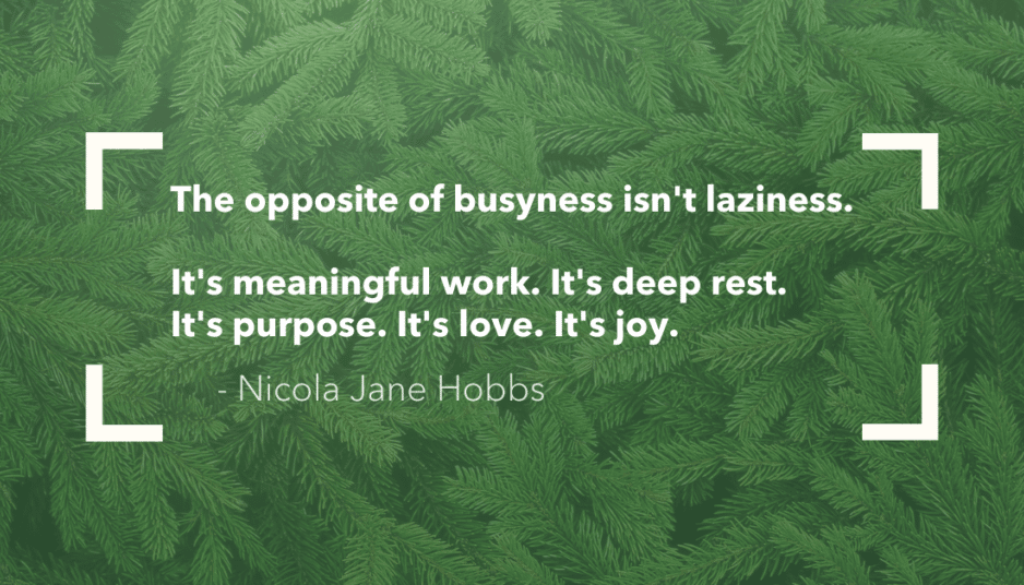What Might Happen if We Banished Our Obsession with “Busy”?

This is a guest blog post from my dear friend, Kris Taylor. She is the founder of Evergreen Leadership, an extraordinary coach, trainer, and speaker. Kris has taught me so much and graciously agreed to share her recent blog post about busyness. I’m confident you will learn from her as well. Enjoy!
I admit it. I am a recovering “very busy person.” For far too long, I wore busy as a badge of honor. I worked too long and too much. I became fidgety if I wasn’t doing something, anything. I was weary most of the time. And even on those days when I had put in a herculean effort at the expense of my health and my relationships, I most often felt it was not enough.
I’m getting better at not letting the pressure to be busy (primarily self-inflicted) get to me. But in all honesty, I still struggle. With several things including:
- How do I reply to the constant question, “Are you keeping busy?:” For that question seems to be code to a bigger question: Are you valued, wanted, productive?
- How do I rewire my inner critic that chides me when I take a break, rest, or have days in flow mode rather than frantic mode? How do I convince myself that continual busyness is not how I want to live my life?
In the past few years, I’ve been on a quest to reframe “busy” for myself and others. It is a mighty big challenge in a culture with a “busy” fetish and where “not busy” can be equated to a host of negative connotations.
Reframing Busy
Face it. Our culture celebrates busyness. Being busy is the norm, the standard that says you are valued and are adding value. That your life is full. That you are contributing. Even when, deep down, we see that busyness is not the same as productive. Even though we know, deep down, that extreme busyness is not sustainable. That there is a physical, mental, and spiritual price to be paid for chronic busyness.
For decades of my life, I vividly recall feeling as if I couldn’t take a breath, that I’d fall behind or not get the hundreds of things on my “to-do” list done – no matter how insignificant they were. There were years of continually pushing myself to do more for others and less for myself. To power through tiredness, no matter what the cost.
We (or at least I) confused busy with productive, busy with valuable, and busy as the opposite of lazy. I am now appalled as I recall being proud of sleeping only 4 hours per night to get through grad school while working full-time and raising a family. Or the conversations at work with my female peers as we boasted of all we had gotten done the night before – trying to earn the bragging rights to being the busiest.
But then, after far too many years of racing through life, doing more and more, and still not feeling “enough” – I’ve started to reframe busy in different ways:
What if busy was a state of dysfunction? What if it was a signal that you’d allowed your life to get out of control? That it was an indication of being unable to set clear priorities and stick to them? That busy meant you were unable to get what needed to be done in an efficient or timely manner? That being busy was a sign of inefficiency? A signal that you devalued your health, both mental and physical?
Those questions helped me see “busy” through a different lens – a lens that has allowed me to see busy as a chosen state and not a desirable one.
Others have aided me in my quest to reframe busy. One is Jayia John (who I’ll quote several times in this blog):
Busy is not a competition. It is an insidious race to more and more and even more, while depleing many of the things that really matter- time for relationships, rest, reflection, and fun.
Or, as the haunting song lyric from Alabama reminds us:
I’m in a hurry to get things done
Oh, I rush and rush until life’s no fun
All I really got to do is live and die
But I’m in a hurry and don’t know why
Overcoming the Busy Guilt Trip
Yet, I would be remiss not to share that reframing is as simple as flipping a switch. I catch my critical inner dialogue more often, but not always. I celebrate the days when I am in a healthy flow but then hit a patch where I’m off on a wild tear again. And I continue to struggle mightily with disassociating busy with “lazy” or “not valuable.”
And in those times, I remember this wisdom from Jayia John:
The only ones who benefit from your guilt about resting are those who have been exploiting your labor and your body all along. This is why, in my opinion, the busy trap is especially toxic for women, who even though things are improving, still carry the lion’s share of the workload at home, even with many other external demands. I also see in our corporate cultures the unrelenting pressure to do more at the expense of our health, our relationships, and our lives in general.
Antidotes for Busyness
I’ll be the first to share that I don’t have this perfected. But I have found a few “antidotes” for busyness that I’ll share.
I’ve gotten a lot better at monitoring my energy. When my gas tank is low, and I grow weary, I permit myself to take a break. I’ve learned that more time at the PC, desk, and the task is not the answer. Often with even a 15-minute break, I can come back and finish in 30 minutes what it might have taken an hour to do had I plowed through (and the quality is higher).
It may come with age, but I’ve come to value rest in ways that were not present in my earlier year. I strive to get at least seven hours of solid sleep a night. At times, I take an afternoon nap. And each time, I notice that I’m more productive when I do work. More clear-headed. More thoughtful. Less frazzled and frustrated. As Jaya says:
“Every single thing in your life heals and blooms when you rest.”
My third antidote is to be OK with less. Not perfect, but good enough? Then it is time to stop putting in the additional effort! Things I feel I “should do” rather than “want to do” – take them off the list. The more I shed the irrelevant things, the more I can focus on what really matters. Less really can be more!
Learn Ease –Ease, to me, looks like taking a breath and focusing on what is most important. It is letting go of minor annoyances. It is allowing emotions to flow through me and then out of me rather than bottling them up. It is days filled with work that matters, delivered in ways that nourish rather than deplete my body and soul. It’s not easy to be at ease, yet for me, the more I notice those hours or days of grace and ease, the more I am able to notice when I’ve slipped into “disease” and can take action to self-correct.
Acknowledge what you have done. One of the best practices I’ve incorporated is, at the end of the day, to look into the mirror and just say: What you have done is enough.” – For truly it is. No matter how much or how little. It is enough, and it is time to rest and prepare to do more of the right things tomorrow.
Moving from Busy to Bountiful
I’m not there yet, but I’ve seen what happens when I fail to let the need to be busy hijack my work, body, spirit, and relationships. As Jayia reminds us:
We believe we can work ourselves to life, instead, we work ourselves to death.
The odd thing is that on the days or weeks I can make the shift from busy to bountiful, my work is better. I am healthier and lighter. I sleep better and deeper. From Jayia:
“Your life will go from exhausted productivity to vibrant fruitfulness.”
So go rest. Take things off your to-do list. Breathe. Reflect. Focus on the most important things and let the others slide away.
A Request
I’m still searching for a catchy reply when folks ask me if I am busy. I’d love to disrupt our thinking about busy – and yet don’t want to sound snarky, judgemental, or flip.
All ideas are welcome! You can connect with Kris Taylor on LinkedIn.






